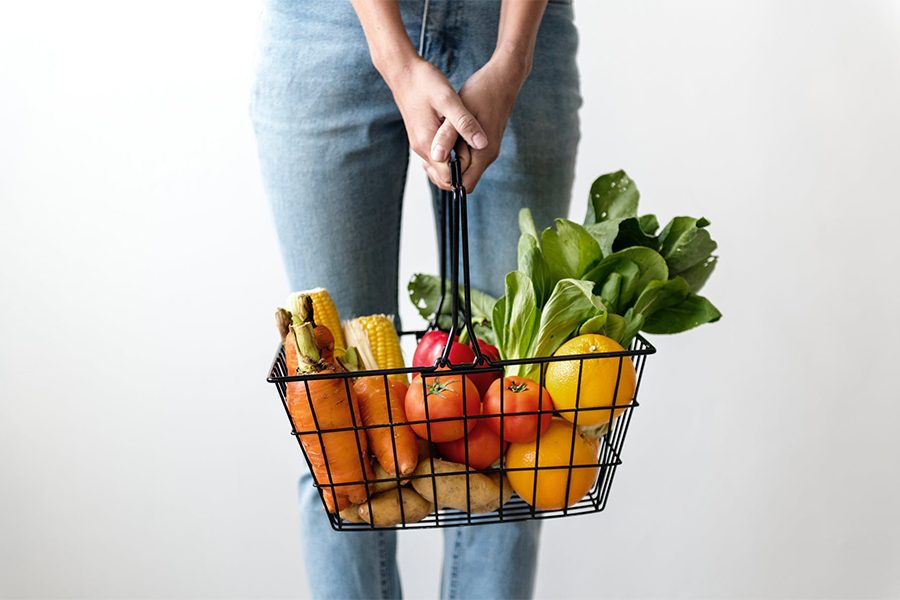Should We Go Vegan? Probably
Advantages of Veganism, Vegetarianism
Photo by rawpixel.com from Pexels
There are plenty of reasons to go vegan, vegetarian, or even just establish a limited meat diet. It is becoming somewhat of a trend, as some consider it ethically wrong to eat animals. It can improve your health and it can improve the health of the Earth.
October 4, 2019
There are plenty of reasons to go vegan, vegetarian, or even just establish a limited meat diet. It is becoming somewhat of a trend, as some consider it ethically wrong to eat animals. It can improve your health and it can improve the health of the Earth. I’ll be focusing on those last two to highlight the important reasons for people, especially those in our generation, to limit our meat consumption.
1. Helps Limit Greenhouse Gas Emissions
With the way climate change is quickly progressing and in light of the recent climate strike seen all over the world last week, one of the most important environmental reasons for this change in your diet is the reduction of greenhouse gasses. According to an article by environmentalists, Robert Goodland and Jeff Anhang, meat production requires an enormous amount of energy. Fossil fuels are burned in almost every part of the process including the raising and slaughtering of animals. In 2018, meat production accounted for 51 percent of annual worldwide greenhouse gas emissions.
2. Conserve Water/Food
Every day, the earth’s food and water resources decrease as we increase our population and general consumption. When you eat an animal you’re consuming the water that the animal needed to live and grow. According to an article from The Oxford Academic, as meat production increases, the water available for both drinking and raising of crops decreases. Meat production also takes up a large number of ingredients that could be used in plant-based products for humans. According to a CNN article written by Dr. George C. Wang, nearly 800 million people worldwide suffer from chronic undernourishment, while 35 percent of grains are given to livestock.
3. Helps Fight Against Heart Disease and Some Cancers
A limited meat diet can force you to eat more fruits and vegetables, which help to fight off potentially life-threatening conditions like heart disease and cancer. According to an article from Healthline, a website for health and wellness information written by licensed nutritionists and dietitians, studies that compare the vegan and vegetarian diet to that of the general population show that non-meat eaters have a 75 percent lower risk of developing high blood pressure and 42 percent lower risk of dying from heart disease. According to an article from The Academic Journal of Clinical Nutrition written by Winston J Craig, a member of the Department of Nutrition and Wellness at Andrews University, many of the same reasons for a lower risk of heart disease also apply to a lower risk of cancer. Vegans and vegetarians tend to eat more legumes (beans), total fruit and vegetables, tomatoes, allium vegetables, fiber and vitamin C, all of which are known to reduce the risk of cancer. Fruits and vegetables are protective against cancers of the lung, mouth, esophagus and stomach, while fiber, vitamin C, carotenoids, flavonoids and other phytochemicals provide protection against various cancers. In addition, allium vegetables, which are high in beneficial sulfur compounds such as onions and garlic, provide protection against stomach cancer and foods rich in lycopene, such as tomatoes, are known to protect against prostate cancer.
4. Eat Less Processed Foods
A vegan diet guide by Heather McClees, a certified nutritionist and vegan herself, highlights that if you were to go grocery shopping with the goal of buying little to no pre-packaged foods like frozen meals or boxed dinners, you’d be forced to buy healthier products. She also clarifies that not all pre-packaged foods are processed and that the key is to choose packed foods with five ingredients or less such as hummus, fruit and nut bars or frozen veggies and fruits. She also highlights a wholefoods, plant-based diet, which specifically includes no processed foods and very limited amounts of meat products, all of which can improve your general health as well as help protect against the previously mentioned health conditions.
And now, with such information and in-depth research at your fingertips, I have to ask you. Why haven’t you made the change yet? Even more so, why haven’t I?

![Posing with their UIL State Trophy, the Robolobos Van Halen Team beams with excitement after their win. “It was a team effort,” junior Noah Vo said. “I was happy because something happened in the first match and the match was also really close. So [when] they finally revealed it, I was pretty happy.” Photo courtesy of Amy Lovelace](https://cphswolfpack.com/wp-content/uploads/2025/05/IMG_0910-EDIT-1200x723.jpg)

![Broadcast, yearbook and newspaper combined for 66 Interscholastic League Press Conference awards this year. Yearbook won 43, newspaper won 14 and broadcast took home nine. “I think [the ILPC awards] are a great way to give the kids some acknowledgement for all of their hard work,” newspaper and yearbook adviser Paige Hert said. “They typically spend the year covering everyone else’s big moments, so it’s really cool for them to be celebrated so many times and in so many different ways.”](https://cphswolfpack.com/wp-content/uploads/2025/05/edited-ILPC.jpg)













![Bringing her arm over her head and taking a quick breath, junior Lauren Lucas swims the final laps of the 500 freestyle at the regionals swimming competition on date. Lucas broke the school’s 18-year-old record for the 500 freestyle at regionals and again at state with a time of 4:58.63. “I’d had my eye on that 500 record since my freshman year, so I was really excited to see if I could get it at regionals or districts,” Lucas said. “ State is always a really fun experience and medaling for the first time was really great. It was a very very tight race, [so] I was a bit surprised [that I medaled]. [There were] a lot of fast girls at the meet in general, [and] it was like a dogfight back and forth, back and forth.” Photo by Kaydence Wilkinson](https://cphswolfpack.com/wp-content/uploads/2025/03/Kaydence-2.7-23-edit-2.jpg)
![As the support team sits and poses for a photo in the cafeteria with the counseling team they eagerly wait to start their day. "We [all] seem to be a team, I get up every day and there's days where I don't want to go to work today, but I'm thankful that I have a job and I'm blessed to have what I have," Christopherson said. Photo Courtesy of Julie Weltens.](https://cphswolfpack.com/wp-content/uploads/2025/01/AF9E8470-10D7-4C91-BF28-EC8F86BAB66C-1200x852.jpeg)
![Officer Stephanie Cash is in her second year as an SRO at CPHS. “Seeing [students] grow over the years has been kind of cool,” Officer Cash said. “Freshmen that [are] all over the place and then in the next couple of years get a little more squared away and go to class and do work and start thinking about the future. Being a part of a student's growth is the best way to measure my success as an SRO.” Photo Courtesy of Cedar Park Police Department's PIO, Alicia Gallagher.](https://cphswolfpack.com/wp-content/uploads/2024/12/CPHS-SRO-900x1200.jpg)



![Taking a breath as he raises his arm up and out of the water, sophomore Kaden Padilla swims the 500 freestyle at the UIL state meet on Feb. 21-22. Padilla placed 10th overall and second in the consolation final in the event, dropping two seconds. “My family was there, so being able to drop time for them was really special,” Padilla said. “It was awesome [finding out I advanced to the consolation finals]. I wasn’t expecting it, and I was very surprised. My parents being there definitely made me a lot happier knowing they got to see me swim in finals.” Photo by Skyler King.](https://cphswolfpack.com/wp-content/uploads/2025/03/kaden-padilla.jpg)

![Three defenders try to stop senior point guard Hope Edwards before the ball leaves her hands. The girls basketball team faced Liberty Hill on Feb 21, losing 58-40. “[My season was] definitely bittersweet,” Edwards said. It's definitely sad [because] I'm gonna miss all my teammates, my coaches and just the whole CP environment.”](https://cphswolfpack.com/wp-content/uploads/2025/03/julia-128-1200x800.jpg)
































